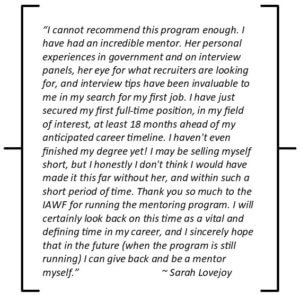Applications are now being accepted for the next mentoring cycle, which will run from February – July 2026.
Apply to be a Mentee
Apply to be a Mentor
What is mentoring?
The first mentioning of the word “mentor” goes back to an ancient Greek story about a young child called Telemachus who grew under the supervision of an old trusted friend of his father’s named Mentor. Since then, the name of this character started being used as a common term for “trusted tutor”.
Today, we use the word “mentor” for anyone who makes a positive, guiding influence on another person’s life. ‘Mentoring’ is the process of direct transfer of experience and knowledge from one person to another.
IAWF’s Approach
The IAWF will have an open period for applications two times per year. After the applications are received and reviewed, we will match the mentors and mentees based on interests and geographic location. IAWF encourages both face to face mentoring and online remote mentoring, depending on the location of the participants. Both parties will need to mutually commit to six months. We will provide you with resources, i.e. checklists, agreements, suggestions, etc.
IAWF membership is required to participate in the program, however, mentees may request a membership waiver.
Both mentors and mentee must agree to abide by our principles of conduct.
Mentoring Program Summary (pdf)
Article on Mentoring by past IAWF President Michael DeGrosky (pdf)
Timeline
- Application period open through January 12, 2026.
- Send mentor information to mentees to select their top choices: January 13 – 27, 2026.
- IAWF will review applications and introduce matches: January 28, 2026.
- Kick Off Meetings via Zoom: February.
- Mentoring Period: February – July 2026.
What makes a good mentor?
- Commitment to the mentee’s learning and project goals.
- Ability to provide positive feedback, encouragement, and advice when requested.
- Interest in seeing and supporting the mentee’s growth and success in their professional or personal goals.
- Ability to ask key questions to support the mentee to develop their problem-solving and creative thinking skills, and to be resilient and independent.
- Ability to establish clear expectations and commitments, to express these to the mentee, and to ask for the same.
- Generosity with tools and approaches that support others to learn
- Willingness to share key contacts and networks with the mentee, and to source other areas of expertise when required.
What makes a good mentee?
- Willing to ask questions: Asking questions can be scary. Some mentees are timid. But being able to ask questions is key. If your mentees feel uncomfortable, supply them with a list of questions to choose from or organize some ice breakers.
- Open minded to what they don’t know: Did we say there was no such thing as a bad mentee? We were wrong! A mentee who thinks they already know the answers to everything is likely not going to be a successful mentee. Mentees who are open to learning get more out of a mentorship program.
- Honest about how they want to grow: It can be hard to talk about areas where you have to grow or to share your big ambitious career dreams. Doing both with their mentors openly will help mentees get the kind of advice that will truly be invaluable.
- Eager to learn: Who doesn’t love to learn? Apparently, some mentees. You want mentees who are excited to learn more about their profession. If they’re not, they might not be right for your program just yet.
If you have any questions please contact Mikel Robinson

